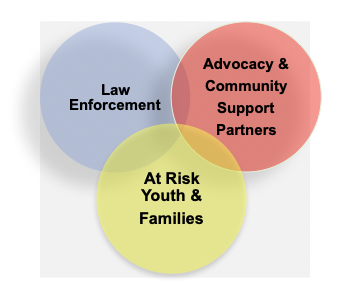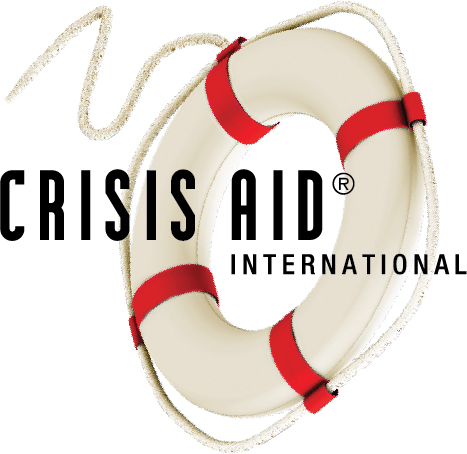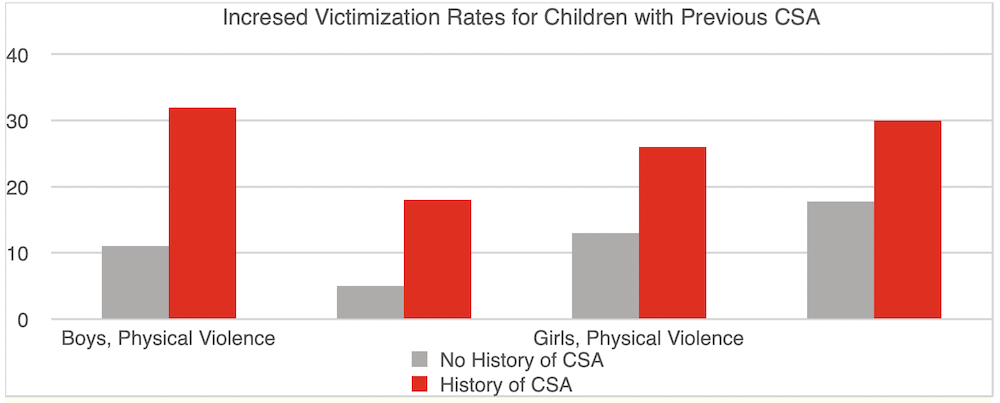CAP
Children’s Anti-exploitation Partnership
What is CAP?
CAP is a revolutionary new collaborative initiative that focuses on reaching children at risk for sex trafficking or other forms of child sexual abuse. CAP provides advocacy, resources, and support to children and families identified in internet/electronics-related crimes against children and human trafficking investigations. CAP. provides tools such as assistance accessing Internet Safety Education (ISE) programs to help parents of children engaged in high-risk sexual activities online, activities that leave them vulnerable to trafficking or other forms of sexual abuse.
How CAP Works Collaboratively
CAP integrates individual and familial support with the education of parents, first responders, seasoned and newly assigned crimes against children detectives, human trafficking investigators, educators, and key community entities with ties to our most at-risk populations. CAP is set up to provide support to help prevent the child from falling prey to further victimization (leading to future trafficking or exploitation).
According to Missouri DSS “millions of children under the age of 18 use the internet daily in the United States…Children can be exposed to inappropriate content, child pornography, and harassment while online. This information can be transmitted to children through the use of chat rooms, e-mails, or Instant Messaging. Child predators use the internet to chat with children, gain their trust, and then arrange meetings with them”. These children are at increased risk for sexual abuse including sex trafficking.
Your support is helping Crisis Aid REFUSE TO DO NOTHING. We are collaborating with the St. Louis County Police Department’s Special Investigations Unit (SIU) a specialized unit that houses detectives from multiple jurisdictions that work as a team assigned to investigate trafficking and electronic / Internet-related crimes against children.
Children identified in these investigations are not only at high risk for sexual victimization but are at heightened risk for future victimization. By accepting an invitation to open a satellite office embedded within the SIU in 2018 Crisis Aid became one of a few organizations in the world which have a physical full-time presence in a police department to support victims of sex trafficking as an extension of our U.S. Refuge services. Our new satellite office in the police department is designed trauma-informed with a warm and home-like feel.
In 2021 Crisis Aid expanded collaborative work with law enforcement as part of a revolutionary pilot program focused on changing the experience for children and their families identified in these investigations.

CAP Provides Support to:
1. Help families address any potential lack of resources.
2. Assists families with accessing tools to address high-risk behaviors in youth when appropriate such as Internet Safety Education (ISE) tools.
3. Connects families to community support resource referrals services such as individual and family counseling.
Sexting & Pornography:
“With easy access to pornography, we are seeing more and more sexual behavior from children at younger ages.”
The Need for CAP:
Considering statistics showing that 20% of female children experiencing Child Sexual Abuse (CSA) in the United States and the lowest estimate 60% (based on large-scale controlled studies and resources referenced below) will be re-victimized.
This means that statistically 194 of the 323 individuals enrolled in CAP will experience child sexual victimization such as child sex trafficking without CAP intervention or similar services.


The pilot program has a dual focus:
For families with young children: Crisis Aid provides support to the family addressing any potential lack of resources while also assisting families with accessing tools to address high-risk behaviors in youth when appropriate such as Internet Safety Education tools and assistance accessing community support services such as individual and family counseling.
For teens: who are have been victimized or identified as at high-risk Crisis Aid advocacy staff provide emotional support through the criminal justice process, safety planning, and information on trauma, resources, and healthy boundaries.
Our goal is to provide support to help the young person begin the healing process and mitigate the likelihood of the child falling prey to further victimization. For these young people, this support is critical. The majority of the teens we work with are struggling with myriad challenges in their young lives often including child sexual abuse, familial incarceration, and experience in foster care and/or residential placement. Often when the teen initially comes into contact with law enforcement and Crisis Aid and they are mistrustful, confused, and scared. But as they start to build rapport with their advocate and detective and receive support services you can see the teen’s trust and openness in discussing their fears and experiences materialize as they clearly begin to see the police department as a safe place where they can always get help.
Amazingly with ongoing support many of the teens go from being afraid of coming to the police station to initiating requests to come back to the police station to meet with the advocate or discuss something going on in their life with the detective that is making them feel unsafe!
Together with your support and our law enforcement collaborators we are not only helping child victims but preventing child victimization! Since the expansion of these services began in December 2018 Crisis Aid has provided crisis intervention support to over 100 young women, teens, and young children identified in trafficking and sexual exploitation investigations and their family members.
Resources for Parents
Crisis Aid International: For Resources, Advocacy or Support: cmalott@crisisaid.org, call or text: 314.714.8229
Parents Lead: Parents Lead is an evidence-based prevention program that provides parents and caregivers with a wide variety of tools and resources to support them in creating a safe environment for their children.
Common Sense Media: Game Reviews – Kids Games Common Sense Media provides reviews of apps, games, movies, television, music, and more. Follow the link above to get up-to-date, in-depth reviews of online gaming programs for kids of all ages.
E-Safety Commissioner: How to Create a Safer Gaming Environment for Your Child | Unwanted contact and grooming | Unwanted contact — signs to look out for. These three articles come from the Australian E-Safety Commissioner and they give more information on creating safer gaming environments, signs of unwanted online contact, and what to do in the aftermath. They contain helpful videos, discussion points, and information that can be filtered according to the age of your child.
Missouri Internet Crimes Against Children Task Force: Resources and Training as well as tips for talking to your children, downloadable resources, and helpful advice for families and caregivers.
USA Kaspersky: Internet Safety for Kids: Top 7 Online Gaming Dangers This article details different risks associated with online gaming and how you can deal with them as a family.
Society for Adolescent Health and Medicine – SAHM: Mental Health Resources For Adolescents and Young Adults. This link contains a great deal of online mental health resources for adolescents and young adults. It includes other links to websites, articles, apps, and online peer
National Center for Missing and Exploited Children: A private, non-profit 501(c)(3) corporation whose mission is to help find missing children, reduce child sexual exploitation, and prevent child victimization.
NetSmartz: NCMEC’s online safety education program. It provides age-appropriate videos and activities to help teach children to be safer online with the goal of helping children to become more aware of potential online risks and empowering them to help prevent victimization by making safer choices on and offline.
What Makes CAP Unique?
Deliberate, ongoing, rapport-building, and mentorship between victims, their families, law enforcement, supporting professionals, and Crisis Aid advocates set this program a part. We provide advocacy in the form of emotional support while connecting victims to community resources. The law enforcement piece comes in with the investigating detective who maintains contact with the victim and family throughout the criminal justice process from a more relaxed and supportive position when spending time in the trauma-informed advocacy location. This builds trust and increases the comfort level of the victim encouraging open and honest dialogue not only about the reported crime but other safety issues for the victim.
Supportive Research:
More than 90% of children, sexually exploited commercially have been sexually abused in the past.
Estimate: 76% of transactions for sex with underage girls start on the internet.
– National Institute of Justice
Those who suffer an episode of CSA perform more risky sexual behaviors and are more likely to experience further episodes of sexual victimization during adolescence and early youth. – National Institute of Health studies
1 in 5 girls and 1 in 20 boys is a victim of child sexual abuse. – National Center for Victims of Crime
Children who had an experience of rape or attempted rape in their adolescent years were 13.7X more likely to experience rape or attempted rape in their first year of college. – Bureau of Justice Statistics report
Female victims of CSA are 3 to 5 times more likely to suffer further sexual assault than those who have not suffered CSA. Studies: (Pereda et al., 2016; Godbout et al., 2019).
Sexual victimization in childhood or adolescence increases the likelihood of sexual victimization in adulthood between 2 and 13.7 times. – National Sexual Violence Resource Center


